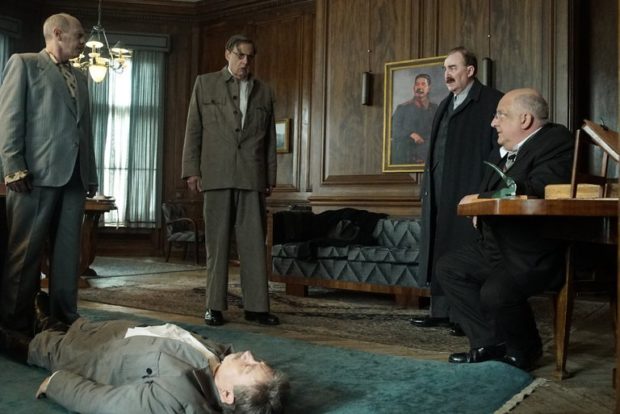
Armando Iannucci’s dark comedy about the death of the infamous Soviet dictator, and the power struggle in the Kremlin that followed, is a fierce satire of authoritarianism and its consequences.
The Death of Stalin is the latest satiric film from Armando Iannucci, whose previous film In the Loop, followed by the similarly themed HBO series Veep, took aim at the viciousness and immaturity of British and American politics. This one has a more peculiar focus—the death of the infamous Soviet dictator in 1953, and the power struggle at the Kremlin afterwards, would seem at first glance to be a tough sell. Some theaters showing The Death of Stalin have put a sign underneath the title that says, “It’s a comedy,” just to reassure hesitating audiences. Well, it is a comedy, but in its depiction of the ruthlessness of power, it’s a very dark comedy indeed. And if you’re willing to watch politicians behaving at their very worst, you might find it as hilarious as I did. It’s based on a graphic novel by Fabien Nury and Thierry Robin, and Iannucci adheres faithfully to a sort of comic book style in the film.
Officially, Stalin died of a cerebral hemorrhage. A certain degree of mystery still surrounds the circumstances. The graphic novel and the film take the liberty of providing their own gratifying version of his death, in which Stalin receives a hate note from one of his millions of victims, starts laughing, and then suddenly collapses on the floor of his study. This is typical of the film, which although based on a fairly accurate framework of actual people and events, also includes some made up stuff, transposes characters from different time periods, compresses events that took months to occur into a single day, and most importantly, has the characters speak in a very modern sounding and terrifically profane style. In other words, don’t go to this movie for an accurate history lesson—what we get instead is a satire on authoritarianism in its purest form, Stalinism being one of the clearest examples of an ideology employed solely for the sake of power.
There are four main characters surrounding Stalin in the Kremlin: Malenkov, a cringing dimwitted yes-man played by Jeffrey Tambor; Molotov, the foreign secretary (Monty Python veteran Michael Palin); Beria (Simon Russell Beale) the loathsome chief of the secret police and a dangerous plotter; and finally, Nikita Khrushchev (Steve Buscemi), the Moscow party chief and Beria’s chief rival. There are quite a few other excellent actors in the film, too many to name. Most of them are British and speak with British accents, whereas Tambor and Buscemi (both very funny, by the way) are Americans and sound like it. Ianucci doesn’t care, and neither should we. It’s all a wild riff on the pettiness of power, and it doesn’t matter how the characters sound, but what they say. And a lot of it seems like those mean little cliques in high school, except with people’s lives and the future of a country at stake. This incongruity is a constant humorous element. When they’re trying to figure out what doctor to contact to try to revive Stalin, they express regret that they already put all the good ones away for treason. (In fact, the so-called “doctor’s plot” was one of Stalin’s last anti-Semitic conspiracy cases that spelled the end for many Moscow physicians.)
Once Stalin is declared dead, his daughter Svetlana shows up, and later his alcoholic nutcase of a son, Vasily, who screams obscenities at every one while the Politburo hands try to calm him down. The funeral itself turns into a ludicrous debacle, but best of all are the central committee meetings, in which the members raise or lower their hands on votes depending on how the wind may be blowing that second. Ianucci has a genius for exposing the silliness of supposed adults using bureaucratic procedure to basically insult one another and gain some sort of temporary advantage. In The Death of Stalin, the constant maneuvering takes place against a background of mass arrests, tortures, and executions. The film doesn’t make light of such horrifying realities, but turns its derisive laughter on the perpetrators, and their ultimately futile machinations, while also presenting a parody of the mind-numbingly boring Soviet style known as “socialist realism.”
The Death of Stalin is strong stuff, but a true understanding of history requires seeing through the smoke screen of official versions, and this movie does the trick splendidly.

A college professor moonlights as an undercover cop posing as a contract killer, in Richard Linklater’s genial spoof. Austin, Texas native Richard Linklater has...

Nicholas Roeg’s 1973 film explores the extremes that the grieving mind can go to, in a story of a couple (Donald Sutherland and Julie...

John Huston’s 1948 classic took some very unusual risks for a Hollywood movie of that era, and it won popular and critical acclaim. I...